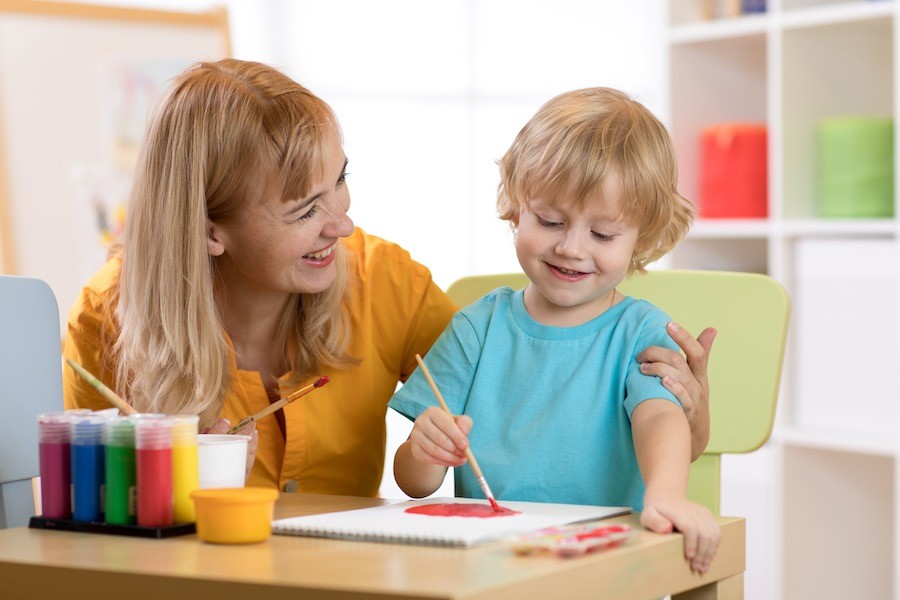How to Support Kids With Emotional Challenges
To support kids with emotional challenges, start by understanding their feelings. Acknowledge and validate their emotions to build empathy. Foster trust through active listening and patience. Encourage them to express emotions openly in a safe space. Teach coping skills like mindfulness and art therapy. Remember, seeking professional help is important for overwhelming challenges. Establish consistent routines and practice self-care to support emotional well-being. This approach helps children feel heard, connected, and equipped to navigate their emotions effectively for a healthy mental state.
Key Takeaways
- Validate and acknowledge their emotions to build trust and connection.
- Encourage open expression in a safe environment to foster emotional growth.
- Teach coping skills like mindfulness and deep breathing for emotional regulation.
- Seek professional help for overwhelming challenges with early intervention.
- Establish consistent routines to provide stability and reduce anxiety.
Understanding the Child’s Emotions

Understanding your child’s emotions is essential in providing them with the support and guidance they need to navigate through challenging times. Emotional awareness is the first step in helping your child develop the necessary skills to cope with their feelings effectively. By acknowledging and validating their emotions, you’re fostering a sense of empathy and understanding within your relationship.
Empathy building is an important aspect of understanding your child’s emotions. It involves actively listening to your child, trying to see things from their perspective, and showing that you care about what they’re going through. By demonstrating empathy, you’re creating a safe space for your child to express themselves openly and honestly.
As you explore your child’s emotions, remember that each child is unique, and their emotional responses may vary. It’s essential to approach each situation with an open mind and a willingness to learn more about how your child experiences and processes their feelings. Your efforts in understanding your child’s emotions will strengthen your bond and help them feel supported as they navigate the ups and downs of life.
Building Trust and Connection

To support children with emotional challenges effectively, fostering trust and connection is essential in building a strong foundation for their emotional well-being. Active listening and validation play key roles in establishing this bond.
When you actively listen to a child—giving them your full attention, maintaining eye contact, and responding thoughtfully—you show them that their feelings are important and valued. Validating their emotions by acknowledging and accepting them without judgment further strengthens the trust between you.
Empathy and patience are key components in building trust and connection with children facing emotional challenges. By putting yourself in their shoes and trying to understand their perspective, you create a safe space for them to express themselves freely. Patience is important as children may take time to open up and share their feelings.
Your consistent presence, understanding, and willingness to listen without rushing them will help nurture a strong connection based on trust and support.
Encouraging Emotional Expression
Encourage children with emotional challenges to openly express their feelings in a safe and supportive environment to facilitate their emotional growth and well-being. Emotion regulation is an essential skill for children facing emotional challenges. By allowing them to openly communicate their feelings, you help them understand and manage their emotions effectively. Encouraging open communication creates a safe space where children feel heard and validated, promoting their overall mental health.
In addition to verbal expression, consider incorporating art therapy and mindfulness techniques into your interactions. Art therapy provides a creative outlet for children to express themselves when words may be difficult to find. Mindfulness techniques, such as deep breathing exercises and guided imagery, can help children regulate their emotions and reduce stress levels. These tools empower children to cope with their emotional challenges in a healthy manner.
Teaching Coping Skills

Consider incorporating various coping skills into daily activities to help children effectively manage and navigate their emotional challenges. Teaching coping skills is essential in aiding kids to handle stress and regulate their emotions.
By introducing mindfulness techniques, children can learn to stay present and aware of their feelings, fostering emotional regulation strategies. Encouraging deep breathing exercises or short meditation sessions can provide tools for stress management.
Additionally, engaging in activities such as drawing, journaling, or physical exercise can serve as coping mechanisms for children to express and release their emotions in healthy ways.
It’s important to create a safe and supportive environment where children feel comfortable practicing these coping skills. By modeling these techniques yourself, you can show kids how to effectively manage their emotions.
Consistency is key in helping children internalize these coping mechanisms, making them more likely to turn to these strategies when facing emotional challenges. Remember, teaching coping skills is a valuable gift that equips children with lifelong tools for emotional well-being.
Seeking Professional Help
If you notice that your child’s emotional challenges persist or seem overwhelming despite efforts to teach coping skills, seeking professional help from a therapist or counselor can provide additional support and guidance. Early intervention is vital in addressing these challenges effectively.
Therapists can offer a variety of therapy options tailored to your child’s specific needs, such as cognitive-behavioral therapy, play therapy, or family therapy. These interventions can help your child develop coping strategies and build emotional resilience.
As a parent, your involvement in the therapy process is essential. Therapists may work with you to understand your child’s struggles better and provide techniques for supporting them at home.
Establishing Consistent Routines
Establishing consistent routines can play an essential role in supporting children with emotional challenges by providing structure and predictability in their daily lives. Daily schedules help children know what to expect, reducing anxiety and improving emotional regulation. Predictable routines create stability, offering a sense of security that can be especially beneficial for kids facing emotional struggles.
When setting up routines, consider incorporating activities that promote emotional well-being, such as dedicated times for relaxation, exercise, or creativity. Consistency in meal times, bedtime, and homework schedules can also contribute to a sense of stability for children dealing with emotional challenges.
It’s important to involve children in creating their routines, allowing them to have a say in establishing the structure of their day. This involvement can empower them and increase their sense of control, which is critical for emotional development.
Practicing Self-Care

Incorporate self-care practices into your daily routine to support your emotional well-being and overall mental health. Prioritizing self-care is essential for managing stress and nurturing your emotional well-being.
Start by setting aside time each day for activities that bring you joy and relaxation. Whether it’s reading a book, going for a walk, meditating, or practicing yoga, find what helps you unwind and recharge.
Stress management is pivotal for maintaining emotional well-being. Identify your stressors and develop healthy coping mechanisms to address them. This could involve deep breathing exercises, journaling, or talking to a trusted friend or therapist.
Remember, self-care isn’t selfish; it’s an essential aspect of maintaining good mental health.
Additionally, make sure you’re getting enough rest, eating nutritious meals, and staying physically active. These basic self-care practices can have a significant impact on your emotional well-being.
Prioritize yourself, practice self-compassion, and remember that taking care of your needs allows you to better support those around you.
Frequently Asked Questions
How Can I Help My Child Open up About Their Emotions?
To help your child open up about their emotions, start by building trust and creating a safe space for them to share. Encourage communication by listening actively and validating their feelings, showing that you are there for them unconditionally.
What Are Some Creative Ways to Teach Coping Skills to Kids?
To teach coping skills to kids, try art therapy for creative expression, mindfulness exercises for relaxation. Incorporate play therapy to make learning fun, and journal prompts to encourage reflection. These methods help children manage emotions effectively.
When Should I Know It’s Time to Seek Professional Help?
When you notice warning signs like persistent sadness, anxiety, or behavior changes impacting daily life, it’s time to seek professional help. Early intervention is vital in supporting kids with emotional challenges. Don’t hesitate to reach out for support.
Is It Okay to Adjust Routines Based on My Child’s Emotions?
It’s important to balance flexibility with boundaries when adjusting routines based on your child’s emotions. Consistency and clear communication are key. Stay attuned to their needs while maintaining a sense of structure and stability.
How Can I Practice Self-Care While Supporting My Child’s Emotional Needs?
To maintain a healthy balance between self-care and supporting your child’s emotional needs, set clear personal boundaries. Seek parental guidance when necessary. Remember that taking care of yourself enables you to better care for others.
Conclusion
To sum up, supporting children with emotional challenges requires understanding, trust, and encouragement.
By teaching coping skills and seeking professional help when needed, you can help children navigate their emotions effectively.
Establishing consistent routines and practicing self-care are also important aspects of providing a supportive environment.
Remember, your support and guidance can make a significant difference in helping children manage their emotions and thrive.
Keep up the good work!

Chad Adan Kace, a young dad from Vermont, shares his parenting journey with a touch of humor and lots of love. Father to a lively baby, he explores the joys and challenges of fatherhood through his stories.







